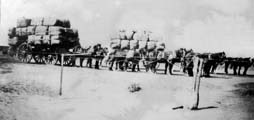Vigars Wells was a natural soak.
Prior to the digging of the wells, it was common for water to break the surface
here.
Water can almost always be found not far below the surface.
The native animals and the Paakantji, Mutthi Mutthi and Ngiyampaa
tribes knew this and would dig here during drier spells for drinkable
water.
Early European settlers were also quick to realise the importance
of such soaks.
Places like Vigars Wells developed as nodes where roads and trails
would intersect.
Vigars Wells was used as a rest and water point by the horse drawn
wagons that passed here.
The Wells were dug in the 1930's by Roy Vicar, and subsequently
lined to prevent collapse.
The soak has only dried up once in recorded history.
Unfortunately the northern of the two wells has succumbed to the
ravages of time, the timbers rotted and the well then collapsed.
All that is left is parts of the fence.
Water attracts life, including the Aboriginal inhabitants, native
animals, stock, and freight.



From 1853 Cobb and Co. coaches began the famous service linking
isolated settlements from Cooktown to Melbourne, from Sydney to
Adelaide.
By 1870 they were harnessing 6'000 horses per day and the coaches were covering
45'000 km each week.
They moved the station people, shearing teams, wool buyers and government people.
The last coach ceased operation in 1924 in North Queensland.
Slower waggons drawn by horse or bullock teams took the wool to the river ports
of Hay, Balranald, Echuca, Mildura, Wentworth and Pooncarie.
River boats cut the wool delivery times to Adelaide by as much as three months.
The coach route crossed the Wall of China Lunette at Vigars
Wells.
Imagine the strain on
the horse teams ... ahead the lonely road ... dust storms ... incredible
heat ... bushfires ... seemingly bottomless mud ... loose sand
... a drink of tepid water by the shepherd's hut ... or as Henry
Lawson wrote in 1879:
"Old coaching towns already "decaying for their sins",
Uncounted "Half Way Houses", and scores of "Ten We Inns";
The riders from the stations by lonely granite peaks;
The brick-boy for the shepherds on sheep and cattle creeks ...
The bravest hearts of twenty lands will wait for Cobb and Co."
|


